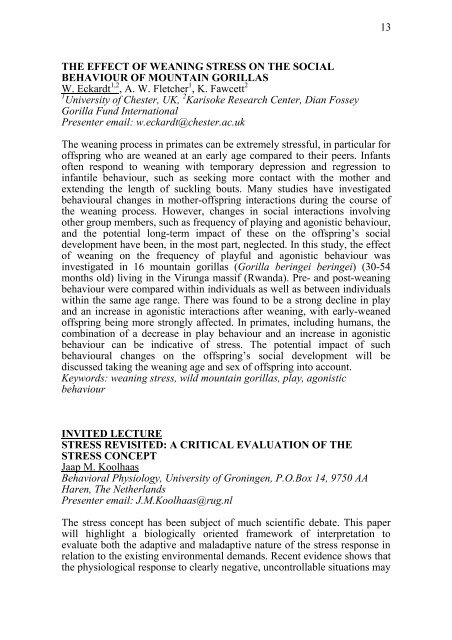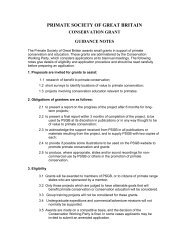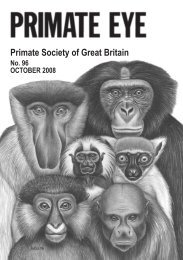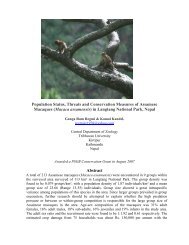2009 Vol 99.pdf (2.45mb) - Primate Society of Great Britain
2009 Vol 99.pdf (2.45mb) - Primate Society of Great Britain
2009 Vol 99.pdf (2.45mb) - Primate Society of Great Britain
Create successful ePaper yourself
Turn your PDF publications into a flip-book with our unique Google optimized e-Paper software.
13<br />
THE EFFECT OF WEANING STRESS ON THE SOCIAL<br />
BEHAVIOUR OF MOUNTAIN GORILLAS<br />
W. Eckardt 1,2 , A. W. Fletcher 1 , K. Fawcett 2<br />
1 University <strong>of</strong> Chester, UK, 2 Karisoke Research Center, Dian Fossey<br />
Gorilla Fund International<br />
Presenter email: w.eckardt@chester.ac.uk<br />
The weaning process in primates can be extremely stressful, in particular for<br />
<strong>of</strong>fspring who are weaned at an early age compared to their peers. Infants<br />
<strong>of</strong>ten respond to weaning with temporary depression and regression to<br />
infantile behaviour, such as seeking more contact with the mother and<br />
extending the length <strong>of</strong> suckling bouts. Many studies have investigated<br />
behavioural changes in mother-<strong>of</strong>fspring interactions during the course <strong>of</strong><br />
the weaning process. However, changes in social interactions involving<br />
other group members, such as frequency <strong>of</strong> playing and agonistic behaviour,<br />
and the potential long-term impact <strong>of</strong> these on the <strong>of</strong>fspring’s social<br />
development have been, in the most part, neglected. In this study, the effect<br />
<strong>of</strong> weaning on the frequency <strong>of</strong> playful and agonistic behaviour was<br />
investigated in 16 mountain gorillas (Gorilla beringei beringei) (30-54<br />
months old) living in the Virunga massif (Rwanda). Pre- and post-weaning<br />
behaviour were compared within individuals as well as between individuals<br />
within the same age range. There was found to be a strong decline in play<br />
and an increase in agonistic interactions after weaning, with early-weaned<br />
<strong>of</strong>fspring being more strongly affected. In primates, including humans, the<br />
combination <strong>of</strong> a decrease in play behaviour and an increase in agonistic<br />
behaviour can be indicative <strong>of</strong> stress. The potential impact <strong>of</strong> such<br />
behavioural changes on the <strong>of</strong>fspring’s social development will be<br />
discussed taking the weaning age and sex <strong>of</strong> <strong>of</strong>fspring into account.<br />
Keywords: weaning stress, wild mountain gorillas, play, agonistic<br />
behaviour<br />
INVITED LECTURE<br />
STRESS REVISITED: A CRITICAL EVALUATION OF THE<br />
STRESS CONCEPT<br />
Jaap M. Koolhaas<br />
Behavioral Physiology, University <strong>of</strong> Groningen, P.O.Box 14, 9750 AA<br />
Haren, The Netherlands<br />
Presenter email: J.M.Koolhaas@rug.nl<br />
The stress concept has been subject <strong>of</strong> much scientific debate. This paper<br />
will highlight a biologically oriented framework <strong>of</strong> interpretation to<br />
evaluate both the adaptive and maladaptive nature <strong>of</strong> the stress response in<br />
relation to the existing environmental demands. Recent evidence shows that<br />
the physiological response to clearly negative, uncontrollable situations may






